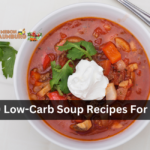Inflammation is the body’s natural protective and healing response to injury or detrimental stimuli. However, chronic inflammation can result in various health problems, including cardiovascular disease, arthritis, and cancer. Dietary choices are an effective method for managing inflammation. Some substances can exacerbate inflammation, whereas others can reduce it. This article will discuss the foods you should avoid if you are experiencing inflammation.
Even though inflammation is a normal bodily response, it can become problematic if it persists over time. There is a significant correlation between inflammation and chronic diseases, according to research. One strategy for addressing this issue is to ingest foods with care.
What is Inflammation?
Inflammation can manifest as redness, edema, pain, or heat, among other symptoms. Inflammation is the body’s method of protecting itself from harm, but it must subside once the threat has passed. Chronic inflammation can occur when the body’s immune system is constantly alert.
The Impact of Diet on Inflammation
Diet plays an essential function in promoting or reducing inflammation. Certain foods can cause the body to emit inflammatory chemicals, contributing to the issue. However, a diet abundant in anti-inflammatory foods can help mitigate this response.
Foods to Avoid for Reducing Inflammation
Here are the leading inflammatory substances and how to limit them.
Added Sugars
Americans’ excessive consumption of added sugars significantly contributes to inflammation, which increases the likelihood of chronic diseases such as diabetes, overweight, and heart disease. Even more frightening is how pervasive sugar addition has become in food products; added sugar can be found in salad dressings, condiments, and savory nibble foods.
Processed Meats
Most processed meats, including bacon, hot dogs, pepperoni, and lunch, are cured with sodium and synthetic nitrates. Frequently, these meats are also rich in saturated fat. According to a study published in the Journal of Nutrition in 2022, regular consumption of refined meats is associated with a reduced risk of inflammation, which many hypothesize results from nitrates and saturated lipids.
Highly Processed food
Manufacturers offer more ready-to-eat meals and grab-and-go foods than ever in response to consumers’ desire for fast, convenient food options. Chemicals and compounds not typically found in food, such as artificial colors, flavorings, and preservatives, are frequently added to make these products shelf-stable or enhance their taste and appearance. Any of these can provoke inflammation by irritating the body. Moreover, if the body is inflamed, it may be hypersensitive to these foreign particulates, increasing inflammation and exacerbating problems.
Refined Carbs
Consuming pasta, white rice, bread, and other carbohydrate-rich foods predominantly composed of refined flour or grains has a more rapid and frequently more significant impact on blood sugar levels. The American Journal of Physiology published a study in 2018 that directly linked nutrients with a more substantial effect on blood sugar and more significant inflammation, leading to the risk of Type 2 diabetes, metabolic syndrome, obesity, and other inflammatory conditions.
Too Many Omega-6 ( and Not Enough Omega-3 )
Most people recognize monounsaturated and polyunsaturated fats as “healthy” fats. These fats contain various proportions of fatty acids, including omega-6s and omega-3s. A study published in the Journal of Lipids in 2021 suggests that most Americans consume excessive omega-6 fatty acids, primarily due to the widespread use of vegetable oils such as maize, soybean, and sunflower in processed and fast foods. And omega-3 fatty acids, which are anti-inflammatory powerhouses, are vastly under-consumed. Overall, the imbalance may contribute to low-grade systemic inflammation.
Trans Fats
Trans fats are created by chemically modifying the structure of unsaturated fats to extend the shelf life of processed goods. However, according to a 2021 study published in Frontiers in Immunology, trans fats are even more detrimental to the body than the saturated fats in butter and red meat. It is mainly due to the inflammation they cause in the body, which has been linked to long-term conditions such as heart and diabetes.
More Than Two Cocktails
In response to a 2019 review released by Molecules, a glass of wine includes compounds that can combat inflammation and oxidative stress, thereby assisting in preventing cardiovascular diseases. Resveratrol is a phytochemical found in red wine (and fruits) that has anti-inflammatory properties. Please be aware that crossing the line from helpful to detrimental is simple. When this threshold is exceeded, not only are the anti-inflammatory benefits lost, but research published in the International Review of Neurobiology in 2022 indicates that alcohol then causes additional inflammation in the body.
Artificial Sweeteners
Although the Food and Drug Administration considers all artificial sweeteners relatively safe, most of those found in restaurants and food products are sweet-tasting synthetic chemical compounds such as aspartame and saccharine. And, especially if there is already a low level of inflammation, the body may perceive these as foreign bodies or irritants.
Meal Planning for an Anti-Inflammatory Lifestyle
Adopting an anti-inflammatory lifestyle entails more than just consuming anti-inflammatory foods; it also requires strategic meal planning that promotes overall health. By carefully selecting ingredients and preparing balanced meals, you can optimize your diet to manage inflammation. Here is how to plan your meals to optimize your anti-inflammatory diet.
Prioritize Variety
Aim to include an array of foods in your meal planning. Each food group offers unique nutrients that collectively help reduce inflammation. Include a variety of vegetables and fruits, lean proteins, whole cereals, healthy fats, and legumes in your diet to ensure you receive a wide range of nutrients.
Incorporate Whole Foods
Select unprocessed, whole nutrients whenever possible. These foods are inherently nutrient-dense and less likely to contain additives that promote inflammation. Select whole grains such as brown rice and quinoa, lean proteins, chicken and fish, and a range of fresh fruits and vegetables.
Plan Balanced Meals
Aim for well-balanced meals containing protein, healthy fats, complex carbohydrates, and abundant vegetables. A balanced entrée might include grilled salmon, quinoa, and a colorful salad with leafy greens, bell peppers, and carrots.
Think Colorful
The colors of the dishes on your plate can indicate their nutritional value. A meal’s vibrancy and color often mark the presence of various nutrients and antioxidants. Include at least three distinct colors in each meal as a personal challenge.
Choose Healthy Fats
Include healthy fat sources, such as seeds, nuts, avocados, and olive oil, in your diet. These lipids have anti-inflammatory properties and can improve fat-soluble vitamin absorption.
Experiment with Spices
In addition to imparting flavor, spices may also have anti-inflammatory properties. Incorporate turmeric, ginger, garlic, and cinnamon into your dishes to improve their taste and nutritional value.
Plan for Snacks
Nutritious snacks can aid in maintaining stable blood sugar levels and preventing excess at meals. For satisfying and healthy refreshment breaks, keep carrot sticks with hummus, Greek yogurt with berries, and a handful of assorted nuts on hand.
Prepare in Advance
Cooking in bulk and preparing meals in advance can be a game-changer for an anti-inflammatory lifestyle. Prepare more significant portions of grains, proteins, and roasted vegetables to construct balanced weekly meals with readily available ingredients.
Hydration Matters
Remember to consider hydration. Water facilitates digestion, nutrient absorption, and all bodily processes. Carry a refillable water container to remain consistently hydrated.
Listen to Your Body
Pay close heed to your body’s signals. Hunger, satiety, and energy levels can help you make the best mealtime decisions. Eating mindfully and intuitively can improve digestion and well-being overall.
Meal planning for an anti-inflammatory lifestyle requires careful ingredient selection, well-balanced meals, and a dedication to overall health. By embracing variety, whole foods, and strategic preparation, you’re setting yourself up for success in managing inflammation and savoring a nourishing, vibrant diet.
Thank you for reading….










